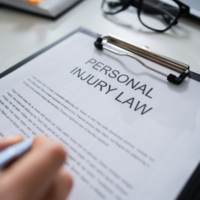Are Hold Harmless Agreements Valid in Florida?

In most cases, when you get injured due to another person’s negligence, the negligent person can be held liable for your damages and losses. However, what happens if you signed a hold harmless agreement before your accident?
Your signature under a hold harmless contract can complicate matters and make it more difficult to seek compensation from the negligent party. While most hold harmless agreements are valid in Florida, it is essential to consult with a Miami personal injury lawyer to determine the validity of the contract in your specific situation.
What Are Hold Harmless Agreements?
Hold harmless agreements are commonly referred to as waivers of liability and indemnity agreements. An agreement comes in the form of a clause or contract that prevents the signee from holding the other party liable in the event of injuries.
Hold harmless agreements are more common than people think. For example, you may be required to sign a waiver of liability when purchasing tickets to an amusement park or sporting event or buying a gym membership.
Are Hold Harmless Agreements (Waivers of Liability) Valid?
If you sustained an injury after signing a hold harmless agreement, you might question the validity of the waiver of liability. Whether or not you can hold the other party liable for your injury depends on the scope of the waiver, the language in the clause or contract, and the negligent party’s conduct.
For example, if a hold harmless agreement does not explicitly state that the property owner cannot be sued for negligent actions, the signee could seek compensation if the owner’s negligence caused their injury.
If the hold harmless agreement specifies that the property owner cannot be held responsible for the signee’s injury caused by negligence, the waiver of liability could release the owner from liability. However, it is still advisable to consult with a knowledgeable lawyer to evaluate the validity of the hold harmless agreement in your case.
Note: Any waivers of liability may not prevent the injured party from suing a property owner or business if the injury was caused by intentional or reckless conduct.
Can I Sue a Negligent Third Party?
The signee could also be injured as a result of negligent actions by a third party. When this happens, the hold harmless agreement does not protect third parties from liability.
It is not uncommon for property owners and businesses to hire third parties to maintain their premises or equipment and do other types of work. When a third party’s negligence results in your injury, you can hold the third party liable for your damages despite signing the hold harmless agreement.
It is essential to contact an experienced attorney to discuss your options if you were injured after signing a hold harmless agreement or waiver of liability. Your lawyer will look for any ambiguity or vagueness in the contract to help you recover damages.
Schedule a consultation with our attorneys at Pita Weber Del Prado to talk about your particular situation and help you recover damages after signing a waiver of liability. Call 305-670-2889.



